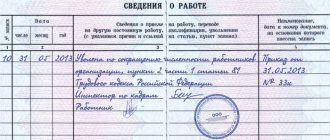The activities of the security service (SS) of any commercial organization on the territory of the Russian Federation are carried out in accordance with the requirements of regulatory legal acts and internal regulations of the company:
- Regulations on the security service of an organization conducting commercial activities.
- Security concept.
- The rights and obligations of the Security Council, determined by the internal regulations of the company. It is this documentation that determines the main functions of the security service in a particular organization.
What qualification requirements apply to the head of the security service?
The decisive factors in determining the nature of the work of the security system in each specific case are the following:
- Features of the company's organizational structure.
- Location of its branches and divisions.
- Scope of activity of the enterprise.
Taking into account the fact that the security system must not only prevent any damage to the company from the outside, but also guarantee safety within the team, ensure the quiet work of conscientious employees, a thorough check of candidates hired for work is carried out. Naturally, in this case, legal issues arise, since in this case the Security Council is a private structure and a large amount of information is by definition inaccessible to private practice specialists. It is for this reason that the security check of a private company is relatively superficial and allows only the most serious violations in the biographies of applicants to be recognized.
Is it necessary to obtain from the applicant a statement of voluntary consent to take a survey using a polygraph ?
What does the security service check in most cases?
Not in all cases, candidates for positions are checked by the security service, since this is a rather lengthy, complex and costly process, which is justified only in relation to people applying for the most responsible positions associated with a high risk of corruption. Costs are associated mainly with contacting outsourcing companies that are authorized to collect certain types of information. This allows security personnel to find out the following things:
- List of companies in which the applicant is listed as a founder, chief accountant or director. In addition, you can clarify the organizational and financial status of these companies at the time of application. This information is necessary to eliminate the possibility of industrial espionage.
- The applicant's criminal record (if any), as well as his involvement (both direct and indirect) in the activities of organized criminal groups.
- Work in competing companies.
Is there a sample job description for a security officer ?
Information retrieval techniques are used that are not related to documents. This includes collecting data about the applicant for the position among his former colleagues, acquaintances, friends and relatives. Despite the fact that this type of work is not particularly objective, it is thanks to it that one can learn the most valuable information that allows one to make decisions regarding hiring people.
IMPORTANT! There is an unwritten rule between security officers of different structures to provide information about employees who have committed various malfeasances upon request (even if it comes from companies that are direct competitors), in order to thus eliminate the possibility of hiring unscrupulous persons. After all, it is not always possible to prove an employee’s involvement in a particular offense, so such people are offered to “settle voluntarily.”
Automation of control over employees
All office employees now work on computers, which means you just need to organize the collection of data about what they do on their PCs. Automatic time tracking systems, such as Kickidler employee monitoring software, help with this. It:
- Monitors all activity on the computer: Start and end times;
- Open applications;
- Time spent in each application.
All modules are configurable – don’t need a keylogger?* Disable it. And so on.
The advantages of such solutions:
- Kikidler collects complete data on each employee and presents it to you in a format convenient for work: all information is available in one click;
- The control is 100% objective - it will be easy for you to justify any of your decisions;
- With the right setup, you can build a system in which employees control themselves with the help of Kikidler, and you will only have to exercise “control over control.”
That is, such software saves a huge amount of time, helps to create a comprehensive and unbiased system of control over personnel - this is exactly what is needed.
- Disabling the keylogger function will appear in the functionality of our program very soon.
Analytical work
All other actions are carried out by the security service, as a rule, together with the human resources department. These are the following types of work:
- Analysis of entries in the applicant’s work book. As a rule, attention is focused on why he was fired from his previous job, whether dismissals took place in accordance with current legislation (they are also called dismissals “under the article”), and whether there were repeated dismissals for the same reason.
- Analysis of the duration of work in the same place. In the event that a person changes jobs too often (even at his own request), this indicates that he has certain personal qualities that do not contribute to quickly joining the team.
- Clarifying the reasons why a person had long gaps between hirings. Perhaps he worked unofficially (which, given the desire to take a high position in the company, is extremely undesirable).
- Clarification of all inaccuracies or misunderstandings that arose during the analysis of the applicant’s biography. Security officers clarify these points during the interview. At this stage, the psychological aspect is of greatest importance, since the likelihood that a person will show concern and be caught in a lie by security officers is much higher than when talking with ordinary personnel officers.
Much depends on what position the applicant is applying for. If the work he is performing has nothing to do with trade secrets or other information of great importance, then a call to his previous place of work and a conversation with the company’s security staff will be enough. Otherwise, the most in-depth analysis of the applicant’s biography, especially his career and professional path, will be relevant.
Separately, it should be noted the use of special questionnaires and psychological tests, thanks to which the Security Service and the HR department can catch a person in a lie.
What happens if you don’t control your subordinates?
Actually, nothing good. The following consequences may occur:
Employees will stop working
The most obvious and common result: the cat is out of the house, the mice are dancing. The nature of any person is based on the principle of “saving calories” - if you can’t do something, you really want to do it. So as soon as the manager stops keeping his finger on the pulse, discord begins within the company: people begin to procrastinate and work carelessly.
Of course, there are always highly motivated employees who work perfectly without any external control - the problem is that this is not 100% of your staff. A simple principle works: if you are distracted from control over your people, you will lose efficiency.
You won't notice people who don't cope
Procrastination is the most famous, but far from the only problem that arises in the absence of control over subordinates. The second difficulty that you will certainly encounter is a poor understanding of the capabilities of your specialists.
Typical situations:
- You hired someone who performed well in the interview. He started to take on real tasks and it turned out that the employee was not up to the task - he needed to improve his skills;
- You promoted a subordinate (or gave him a more complex project than usual), and he cannot cope with the new responsibilities;
- The employee has always worked well, but now something has happened in his life and the quality/productivity of his work has dropped.
Without direct control over your people, you will notice all these problems only at the stage of consequences: a disrupted project, a defective product, etc.
You won't notice leaders who can't cope.
The usual vertical control over employee activities: general director – department heads – subordinates. Often in this vertical, a top manager knows about ordinary employees only what mid-level managers tell him: from reports, memos, etc.
The problem in this case is obvious; the head of the department can:
- To deliberately hide something so that his department’s performance on paper looks good, and he himself receives a bonus;
- Dismiss or cause the dismissal of employees useful to the company without objective grounds;
- Missing something is simply due to negligence or due to a lack of qualifications in management activities.
The ability to obtain information about employees not through an intermediate link, but with the help of a well-functioning personnel monitoring system protects you from such problems.
How exactly does control solve these problems?
Properly organized control over employees means:
- Awareness . You will be aware of the affairs of each of your subordinates: how well does he cope with his work? Can an employee be recommended for promotion or a management position? Is he sabotaging the company's activities (simply through negligence - for example, procrastination - or with malicious intent)?
- Motivation . Control is a guarantee that the successes of specialists will not go unnoticed. By paying attention to the achievements of company employees, you increase their loyalty to the organization and create a desire to work with maximum efficiency;
- Discipline . The very fact that a leader constantly has his finger on the pulse is a powerful incentive for subordinates. Employees must realize that the quality of their work directly affects the results they receive: either it will be a bonus or some kind of negative consequences;
However, it is important to understand that all these advantages are provided only by properly organized control.
What positions are being tested for?
Large corporations can afford to check every person they hire, but the closest attention is paid to those people whose work is especially important to the successful business of the company:
- Those who work in departments where significant material assets are concentrated, as well as documentation containing confidential data (this is necessary to guarantee the safety of the company’s trade secrets, as well as personal information of employees and business partners).
- Employees whose activities may cause economic damage to the functioning of the corporation. This category includes those people who work with contracts, economists and accountants, as well as persons whose competence includes the disposal of various forms and seals, and employees of the information technology department.
Myths about employee control
Well, at the end of our article, 5 main myths about control over subordinates.
Myth 1: Monitoring employees is against the law.
Nothing of the kind: according to Article 22 of the Labor Code, the employer has the right to control the performance of labor duties by its employees using the technical means provided by the latter for work. The main thing is that the staff is notified of the ongoing surveillance by the relevant clause of the employment contract or company order.
Myth 2: You only need to monitor problem employees
By focusing on those who are not doing well, you are missing two things:
- Those who work well need to be encouraged - this is no less important than imposing penalties on those who are at fault;
- By observing all employees as a whole, you receive complete information about the state of affairs in the company - it will be easier for you to find new opportunities for developing business processes.
So, partial control of personnel work is a mistake: monitoring must be comprehensive.
Myth 3: only management needs control
In fact, a well-built system of personnel control is primarily useful to the employees themselves. Specialists receive an objective system for assessing their achievements - a safe and transparent working environment is created in which everyone is comfortable.
Myth 4: Employees react negatively to monitoring
Our practice shows that people react negatively not to the monitoring itself, but to its improper use. Excessively tight control, micromanagement, asymmetry - dissatisfaction is caused by what we talked about in the section “Mistakes of Managers.” Avoid them and everything will be great.
Myth 5: Controlling employees is difficult
This was once the case, but now the manager no longer needs to personally stand behind the shoulder of each of his subordinates: everything will be done automatically, and you will be left to make key decisions. As for implementing the Kickidler employee monitoring program, it is much simpler than it seems - the system can be launched in just a couple of days in a large company and in a few hours in a small one.
Monitor your employees and you can effectively manage your company. And we will help you organize such control. Write!
Check period
It is very difficult to name specific dates, since a huge number of different factors matter:
- The position for which the applicant is applying. It is clear that the more serious the audit needs to be carried out, the longer it will take, since more information will be required. In the case when we are talking only about a conversation with the previous employer and several interviews, everything can be decided within 24 hours. If security officers are confused by some fact in the applicant’s biography or for some reason are alarmed by their behavior during the interview, the process may drag on for weeks.
- The professionalism and material and technical base of security officers, their actual ability to search for the necessary information.
- Attempts to hide certain data by the applicant himself.
Scheduled and unscheduled inspection
All employer inspections are divided into three categories:
- Routine inspection according to a predetermined schedule, according to the approved plan. This can be a comprehensive audit of labor activity, including accounting aspects, labor safety, and the activities of the personnel service. Or is it a thematic inspection based on a predetermined list of questions.
- Unscheduled inspection of the employer, according to existing reasons. There is no warning about it, it is carried out without a schedule, but most often the list includes those companies that have previously had serious violations recorded during scheduled visits to employees. Unannounced inspections are possible based on complaints, including labor safety inspections (see the link for more details).
The employer should be aware that the frequency of scheduled inspections in the labor sphere is clearly defined. For most businesses, this is once every three years of operation. Special conditions for educational institutions and medical companies.
At the beginning of the year, a list of enterprises and a calendar plan are published on the official website; the results of any inspections outside this schedule are canceled by law. An unscheduled on-site inspection of the labor inspectorate will not necessarily be sudden; an employee of the supervisory authority can warn about his visit in advance. In practice, such notification can be received one or two days before the inspector arrives.
Particular determination regarding the employer-defendant in the case
Although the court is not a body that supervises or controls the actions of the employer, this body is also entrusted with functions through which it can influence the actions of the employer in addition to the court decision.
Thus, if the court considers labor disputes with employees and the employer, if obvious violations of the legislation of the Russian Federation, and possibly signs of an illegal act, are established in the activities of the enterprise.
In such cases, the judicial authorities are not deprived of the right to issue private rulings in relation to these persons, which are sent either to law enforcement or regulatory authorities to resolve the issue of conducting an appropriate inspection and bringing the employer to liability established by law.
ATTENTION: watch the video on the topic of protecting the labor rights of an employee, and also subscribe to our YouTube channel to be able to receive free online legal advice through comments on the video.








